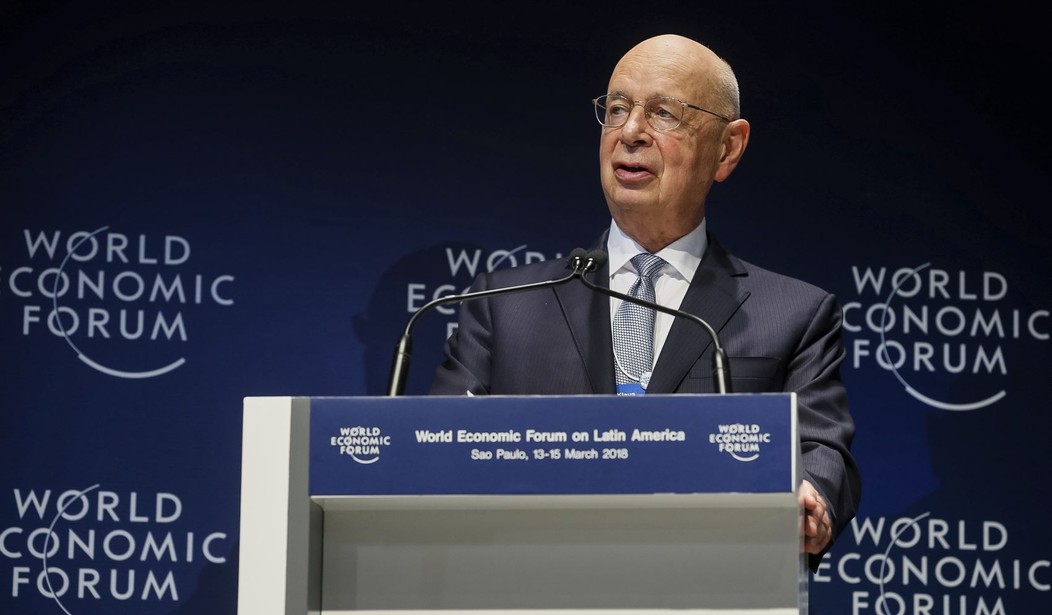(The opinions expressed in guest op-eds are those of the writer and do not necessarily represent the views of RedState.com.)
After a two-year hiatus due to the pandemic, the World Economic Forum’s Annual Meeting has returned to Davos, Switzerland. This year, the usual list of billionaires, world leaders, and global “elites” are gathering in the swanky ski town for a four-day bonanza of lavish festivities, five-course meals, exclusive cocktail parties, and discussion panels, all while they plan the future of the global economy and society in general.
So far, the annual meeting has included the typical talking points about the greatness of globalism, the existential threat of climate change, and the need for the WEF’s pet project known as the Great Reset.
However, for those of us assiduously watching the livestreamed discussion panels (of which there are dozens), one cannot help but notice the prevalence of conversations regarding the inherent virtues of environmental, social, and governance (ESG) scores. Or so they say.
In a nutshell, ESG investing is the latest scheme concocted by globalists, big banks, big business, and many other nefarious actors so they can wield near-total control over the worldwide economy and socially engineer society to their liking.
Although this may sound like a far-fetched plotline straight from the next James Bond film, it is here and it is even scarier than anything Hollywood could ever conjure up.
According to the WEF, ESG scores are the foundation for “stakeholder capitalism,” which the WEF assumes will replace “shareholder capitalism” in the near future.
As the WEF describes it, “Business has now to fully embrace stakeholder capitalism, which means not only maximizing profits, but use their capabilities and resources in cooperation with governments and civil society to address the key issues of this decade. They have to actively contribute to a more cohesive and sustainable world.”
To achieve this new world order, WEF proposes the universal enactment of ESG metrics, which it says, “will drive environmental and social change.”
To date, many of the world’s largest companies, especially investment firms and big banks, have jumped on the ESG bandwagon.
For instance, here is Bank of America Chairman and CEO Brian Moynihan’s startling endorsement of ESG: “Take our 200,000 people, $3 trillion balance sheet, $60 billion of expenses – you start aiming that gun and you take that across all these companies – it’s huge.”
Moynihan added that ESG scores are “statements of what capitalism can do to solve what the world needs – the Sustainable Development Goals.” To achieve these so-called goals, Moynihan said, “It takes $6 trillion to finance those a year and the only way you’re going to do it – charity can’t do it, they don’t have the money, governments don’t have the fiscal capacity, capitalism has to do it.”
Of course, one person’s definition of Sustainable Development Goals is another person’s definition of worldwide crony capitalism. No wonder big business and big finance are going gaga over ESG. If implemented on a worldwide level with a “harmonized standard,” ESG metrics would allow global corporations and investment behemoths like BlackRock to channel trillions of dollars to companies and industries that play nice with ESG.
In other words, ESG scoring empowers multinational corporations and big banks to reward those who are onboard the ESG bandwagon with access to capital while penalizing “bad” companies with poor ESG ratings by restricting access to capital.
As Moynihan describes the new scheme, “It’s actually the operating companies that will make the change happen … and the activities they force downstream are just unbelievable.”
The problem is that ESG scores are completely subjective, subject to change at a moment’s notice, and do not align with the fiduciary responsibility of every business, which is to maximize shareholder value by producing quality goods and services at competitive prices.
Shareholder capitalism, though far from perfect, is the best way to increase prosperity, improve living standards, and drive innovation. Stakeholder capitalism, predicated on universal ESG scores, on the other hand, is just the latest scheme by globalists in their never-ending quest to increase their wealth and power.
Chris Talgo ([email protected]) is senior editor at The Heartland Institute.












Join the conversation as a VIP Member